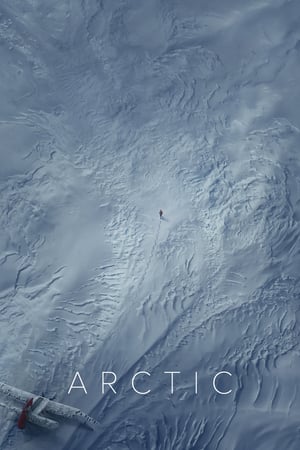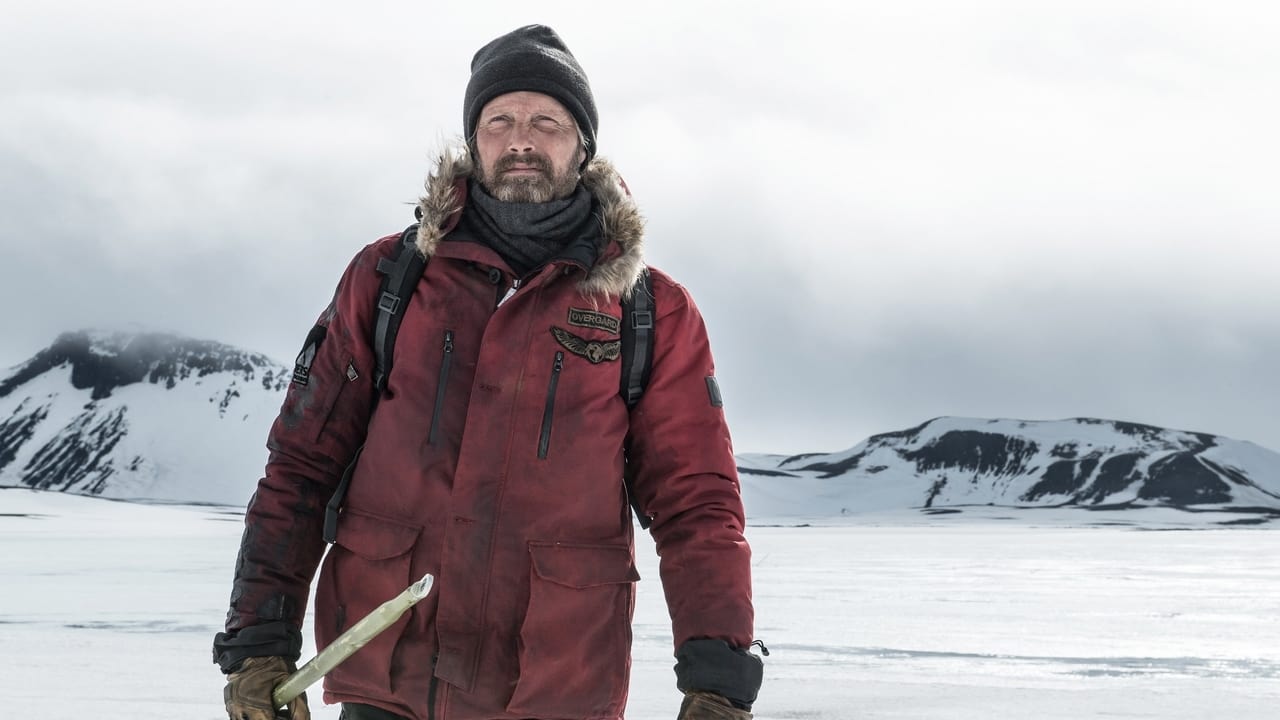
Top of the world
The question that must be answered by a movie titled Arctic, and I daresay the only question: does it seem to be extremely cold? And this is something that the 2018 Icelandic thriller of that very title can answer with an emphatic yes. The cinematography, by Tómas Örn Tómasson, is sublimely severe and unyielding, capturing the hard, angry flatness of white, ice-covered landscapes denuded of any sense of poetry or the otherworldly: the Arctic, in this film, is big, and it is overwhelming, and it is cold, The watery sky and chunky slabs of rock gutting out of the snow do not offer a contrast so much as they surrender to the bleakness around them. It's a pictorially beautiful landscape, but it's also a landscape that is profoundly anti-human, almost impossible to process in terms of scale or shape.
And as for the movie that takes place within that landscape? Sure, it's fine. It is a survival thriller, and it has most of the narrative beats typical of the form; the single film it most recalls is probably All Is Lost, if only because it too includes very little dialogue and ends abruptly after a plot that can be summarised as "one horrible thing happens after another and a man capably solves each problem as it arises, though he gets more worn out each time". The man in this case has a name (revealed on the pocket of his jacket, from some uncertain branch of an unnamed miltary), Overgård, but not an identity; he is played by Mads Mikkelsen as a series of actions rather than as a personality. The actions in question consist of trudging out from a makeshift shelter in a ruined airplane fuselage to run a distress beacon from a hand-cranked dynamo, mapping his immediately visible surroundings, fishing, and constantly watching for any sign of human beings. The latter of these comes to fruition in the form of a helicopter that promptly crashes, leaving the pilot dead and the sole survivor a semi-conscious woman (Maria Thelma Smáradóttir) with identification in what appears to be Thai script. This means double the work of finding sustenance, but at least it gives him someone to talk at, no matter how comatose. Also, it gives him a clear direction in which to head for the nearest form of human habitation, dragging his new friend along on a sled.
As a "how would you survive?" procedural, Arctic is an impressive work of docu-realism. Director Joe Penna, a YouTube-based short film director helming his first feature, remains firmly interested in surfaces, and what happens on them: the surface of the Arctic tundra, the surface of Mikkelsen's increasingly bedraggled body, and all the things in between. It's an extremely unromantic film, devoid of the philosophy of The Grey, the clumsy genre trappings of The Mountain Between Us, or the sheer wretchedness of The Revenant; it is purely mechanical watching what a human being in a position of enormous stress does - and does, and does, and does - to remain alive for the next moderate stretch of time. Mikkelsen's performance, which has been flawlessly worked out technically, contributes to this by appearing to be constantly hunting, hearing, sniffing, looking: not desperation, since that's an indulgence, but constant wiry alertness. All Is Lost was similarly invested in omnipresent survival instinct, but with more of a poetic soul; it is to Arctic much as Robert Redford (that film's star) is to Mikkelsen. This the the more sinewy, harsh, unkind film, direct and savage at every turn.
It's hard not to admire the diligence of the filmmaking team in capturing this feeling, this reduction of the human to the automatic and instinctive, and also foreground the enormous hostility of the Arctic setting. Where I get a bit tripped up is on the rather important question, "yes, but why did you watch it?" And to that, I can only say, well, um... By the standards of the survival genre, it's certain not at all bad, and the confidence of execution arguably makes it much better than average. Mikkelsen's fearless physicality alone makes it at least worth watching. But there's a distinct lack of purpose to it. And a lack of purposefulness, which is different. There's not much actual content or momentum across the film's 98 minutes, which mostly consist of Overgård doing variations on the same few things over and over again, sometimes encumbered by the woman and sometimes not. Around midway through the film, there's an encounter with a very cross polar bear, and while it feels a bit ginned up and melodramatic (not least because this is one of the few places with a prominently loud music cue), it speaks to the more exciting, nerve-wracking, active version of this story that might have been tawdrier, but definitely would have been more fun. A little bit later, Overgård has to make a difficult moral choice, and the process by which he decides what to do is buried underneath an awfully convenient setpiece and the fact that the character has no discernible internal life.
So that's the lack of purposefulness - it simply doesn't go. And maybe that's meant to connect to the endless helplessness of the location. But it's still a bit hard to engage with it. As for the lack of purpose, that's simply down to the fact that this is so great at surface level suffering that it never things to be about anything else but suffering. Except in a largely superficial way, I don't know that the film has anything new to say about what desperate people can do; it has none of the more ethereal qualities of the best survival films, the almost spiritual element of an All Is Lost, or the psychological growth of an Adrift. It just has misery, and a stunned, mildly repulsed awe at how far the human body and will can go in surviving that misery. That's not nothing, but it's pretty damn little, and exemplary cleareheaded, realistic craftsmanship only goes so far in redeeming something so determined to make us feel unpleasant without an outlet.
And as for the movie that takes place within that landscape? Sure, it's fine. It is a survival thriller, and it has most of the narrative beats typical of the form; the single film it most recalls is probably All Is Lost, if only because it too includes very little dialogue and ends abruptly after a plot that can be summarised as "one horrible thing happens after another and a man capably solves each problem as it arises, though he gets more worn out each time". The man in this case has a name (revealed on the pocket of his jacket, from some uncertain branch of an unnamed miltary), Overgård, but not an identity; he is played by Mads Mikkelsen as a series of actions rather than as a personality. The actions in question consist of trudging out from a makeshift shelter in a ruined airplane fuselage to run a distress beacon from a hand-cranked dynamo, mapping his immediately visible surroundings, fishing, and constantly watching for any sign of human beings. The latter of these comes to fruition in the form of a helicopter that promptly crashes, leaving the pilot dead and the sole survivor a semi-conscious woman (Maria Thelma Smáradóttir) with identification in what appears to be Thai script. This means double the work of finding sustenance, but at least it gives him someone to talk at, no matter how comatose. Also, it gives him a clear direction in which to head for the nearest form of human habitation, dragging his new friend along on a sled.
As a "how would you survive?" procedural, Arctic is an impressive work of docu-realism. Director Joe Penna, a YouTube-based short film director helming his first feature, remains firmly interested in surfaces, and what happens on them: the surface of the Arctic tundra, the surface of Mikkelsen's increasingly bedraggled body, and all the things in between. It's an extremely unromantic film, devoid of the philosophy of The Grey, the clumsy genre trappings of The Mountain Between Us, or the sheer wretchedness of The Revenant; it is purely mechanical watching what a human being in a position of enormous stress does - and does, and does, and does - to remain alive for the next moderate stretch of time. Mikkelsen's performance, which has been flawlessly worked out technically, contributes to this by appearing to be constantly hunting, hearing, sniffing, looking: not desperation, since that's an indulgence, but constant wiry alertness. All Is Lost was similarly invested in omnipresent survival instinct, but with more of a poetic soul; it is to Arctic much as Robert Redford (that film's star) is to Mikkelsen. This the the more sinewy, harsh, unkind film, direct and savage at every turn.
It's hard not to admire the diligence of the filmmaking team in capturing this feeling, this reduction of the human to the automatic and instinctive, and also foreground the enormous hostility of the Arctic setting. Where I get a bit tripped up is on the rather important question, "yes, but why did you watch it?" And to that, I can only say, well, um... By the standards of the survival genre, it's certain not at all bad, and the confidence of execution arguably makes it much better than average. Mikkelsen's fearless physicality alone makes it at least worth watching. But there's a distinct lack of purpose to it. And a lack of purposefulness, which is different. There's not much actual content or momentum across the film's 98 minutes, which mostly consist of Overgård doing variations on the same few things over and over again, sometimes encumbered by the woman and sometimes not. Around midway through the film, there's an encounter with a very cross polar bear, and while it feels a bit ginned up and melodramatic (not least because this is one of the few places with a prominently loud music cue), it speaks to the more exciting, nerve-wracking, active version of this story that might have been tawdrier, but definitely would have been more fun. A little bit later, Overgård has to make a difficult moral choice, and the process by which he decides what to do is buried underneath an awfully convenient setpiece and the fact that the character has no discernible internal life.
So that's the lack of purposefulness - it simply doesn't go. And maybe that's meant to connect to the endless helplessness of the location. But it's still a bit hard to engage with it. As for the lack of purpose, that's simply down to the fact that this is so great at surface level suffering that it never things to be about anything else but suffering. Except in a largely superficial way, I don't know that the film has anything new to say about what desperate people can do; it has none of the more ethereal qualities of the best survival films, the almost spiritual element of an All Is Lost, or the psychological growth of an Adrift. It just has misery, and a stunned, mildly repulsed awe at how far the human body and will can go in surviving that misery. That's not nothing, but it's pretty damn little, and exemplary cleareheaded, realistic craftsmanship only goes so far in redeeming something so determined to make us feel unpleasant without an outlet.
Categories: adventure, gorgeous cinematography, thrillers






